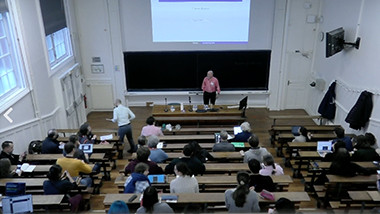
From connecting the dots to conjugacy of dynamical systems
By Pierre Arnoux
Appears in collection : Jean-Morlet Chair 2019 - Research School: Thermodynamic Formalism: Modern Techniques in Smooth Ergodic Theory / Chaire Jean-Morlet 2019 - Ecole : Formalisme thermodynamique : techniques modernes en théorie ergodique
I will present some joint works with Volker Mayer in which we primarily show that for a large class of entire and meromorphic transcendental functions the full geometric thermodynamic formalism holds. Most notably, this means that the transfer operators generated by geometric potentials are well dened and bounded after an appropriate conformal change of Riemannian metric on the complex plane C. We show that these operators are quasi-compact of diagonal type with one leading eigenvalue, which in addition is simple. In particular, the dual operators have positive eigenvalues and eigenvectors that are Borel probability eigenmeasures. The probability measure obtained by integrating these eigenmeasures against leading eigenfanctions of transfer operators are invariant. We show that these measures are equilibrium states of geometric potentials. The primary applications of these theorems capture the stochastic laws such as exponential decay of correlations, the central limit theorem, and the law of iterated logarithm. it also permits us to provide exact formulas (of Bowen’s type) for Hausdorff dimension of radial Julia sets and multifractal analysis. We will discuss two distinct routes (leading to different though overlapping classes of meromorphic transcendental functions) to get the geometric thermodynamic formalism. One of them is based on Nevanlina’s theory and the other on analogues of integral means spectrum from classical complex analysis of conformal maps.
